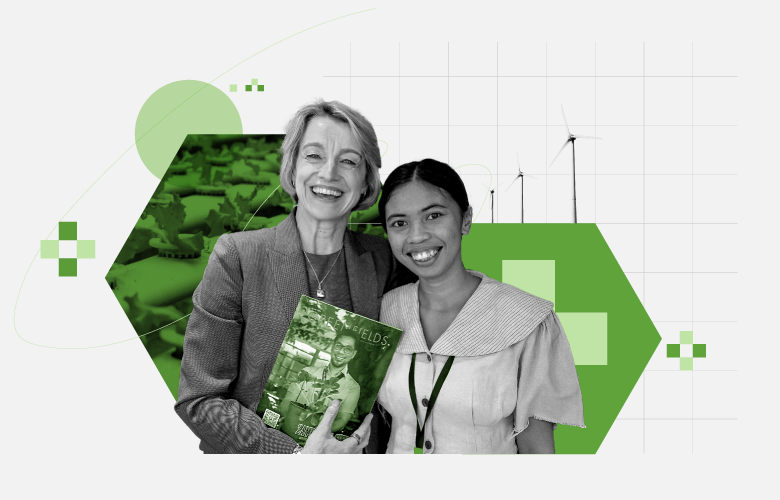
EDC recently launched the Our World, Our Work green jobs initiative, which aims to help 1 million young people, 60% young women, transition to decent, inclusive, sustainable green and blue jobs over the next 10 years.
EDC hosted its first Our World, Our Work Asia Regional Summit in Manila, Philippines, this past April, which brought together EDC staff, youth leaders, and about 70 education and environment actors to discuss and learn what is being done and achieved in the green space. As usual for EDC, youth were front and center in these discussions.
Dr. Liesbet Steer, president and CEO of EDC, highlighted that those who have contributed the least to climate change are disproportionately impacted by it, including youth, women, and marginalized populations. However, while the Sixth Assessment Report of the Intergovernmental Panel on Climate Change (IPCC) highlights that the window to secure a livable and sustainable future is rapidly closing, there is still hope.
Four Filipino youth leaders supported by the USAID Philippines Opportunity 2.0 project reflected this optimism and shared some key thoughts from the youth perspective on the environment and workforce opportunities in the green and blue economies.
Every Action Counts
These four youth leaders agreed that there are no small steps in the battle against climate change—every action counts. “Don’t wait for change, be the change!” said Joshua Moreno, a youth TVET trainer at the Casuga Integrated School in Davao City, calling us to action.
Peer Networks Are Powerful
Diowella Ann Ponteras, a youth volunteer with Kids Who Farm in Zamboanga City, noted that youth can be influencers, mobilizing large networks of peers using their phones, a simple and practical tool. The youth highlighted that if you can make learning about climate issues fun and practical, young people will listen and be excited to get involved.
Wilson Moscare, a youth leader in Quezon City, shared that he tries to interest children and youth in his community by layering green elements onto their existing interests to build their passion to advocate for the environment and reduce the impacts of climate change.
Dyanne Rose Luna, a youth leader from Legazpi City, built on this idea, noting that, “We cannot solve these problems on our own, but need to work together to create the world we want to live in.”
Sustainability is a Frame of Mind
While Our World, Our Work focuses on preparing youth for emerging green and blue jobs, these youth see all jobs as green and blue. They already have the mindset of integrating sustainability into everything they do—both in life and in work. As Wilson defined it, the green and blue economies are “trying to heal nature and make a profit,” showing the mindset that going green is not only an altruistic act but can also be a good livelihood.
It was inspiring to hear the hope and optimism of the youth leaders who were working across their communities to implement positive change. While there is still a huge amount of work to be done to prepare youth for the green and blue economies, including better integrating sustainability into education systems and work-based learning opportunities, these youth are already ahead of the curve in mindset and ideas and in influencing their peers. We have much to learn from them.
Photo (l-r): Dr. Liesbet Steer, president and CEO of EDC, with Diowella Ann Ponteras, a youth volunteer with Kids Who Farm in Zamboanga City.
Laura Dillon is a senior technical advisor for youth and workforce development. Her work focuses on strengthening workforce development eco-systems, including education and training, employment intermediation, and youth entrepreneurship. |

Add new comment